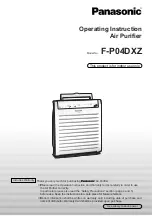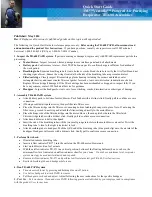
16
3-6-5. Checking After Installation
G
Check that there are no gaps between the unit and the ceiling panel, or between the ceiling panel and the ceiling sur-
face. Gaps may cause water leakage and condensation.
G
Check that the wiring is securely connected.
If it is not securely connected, the auto flap will not operate. In addition, water leakage and condensation may occur.
3-6-6. When Removing the Ceiling Panel for Servicing
When removing the ceiling panel for servicing, remove the air-intake grille and air filter, disconnect the flap and the indi-
cator wiring connectors inside the control box, and then remove the 4 mounting screws.
3-6-7. Adjusting the Auto Flap
The air-direction flap on the ceiling panel outlet can be adjusted as follows.
G
Adjust the flap to the desired angle using the remote controller. The flap also has an automatic air-sweeping mecha-
nism.
G
Never attempt to move the flap by hand.
G
Proper air flow depends on the location of the air conditioner, the layout of the room and furniture, etc. If cooling or
heating seems inadequate, try changing the direction of the air flow.
NOTE
3-7. Wiring Instructions
General precautions on wiring
(1) Before wiring, confirm the rated voltage of the unit as shown on its nameplate,
then carry out the wiring closely following the wiring diagram.
(2) Provide a power outlet to be used exclusively for each unit, with a power supply
disconnect and circuit breaker for overcurrent protection provided in the exclu-
sive line.
(3) To prevent possible hazards due to insulation failure, the unit must be grounded.
(4) Each wiring connection must be done tightly and in accordance with the wiring
system diagram. Wrong wiring may cause the unit to misoperate or become
damaged.
(5) Do not allow wiring to touch the refrigerant tubing, compressor, or any moving
parts of the fan.
(6) Unauthorized changes in the internal wiring can be very dangerous. The manu-
facturer will accept no responsibility for any damage or misoperation that occurs
as a result of such unauthorized changes.
3-8. Recommended Wire Length and Diameter
Regulations on wiring diameter differ from locality to locality. For field wiring require-
ments, please refer to your local electrical codes. Carefully observe these regula-
tions when carrying out the installation.
Table 4 lists recommended wire lengths and diameters for power supply systems.
Refer to the wiring system diagram (Fig. 7a or Fig. 7b) for the meaning of (A), (B)
and (C) in Table 4.
Refer to your local codes or in the absence of local codes see the National Electric
Code: ANSI/NFPA70.
NOTE
08-221 XS1271 9/12/08 2:52 PM Page 16
















































